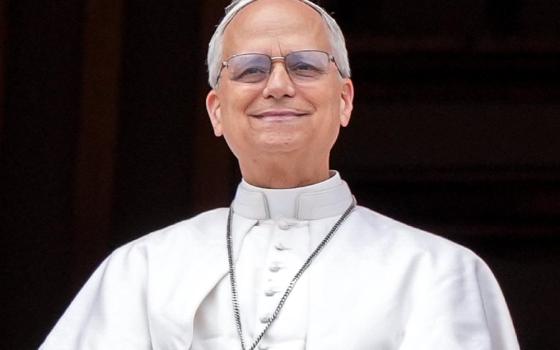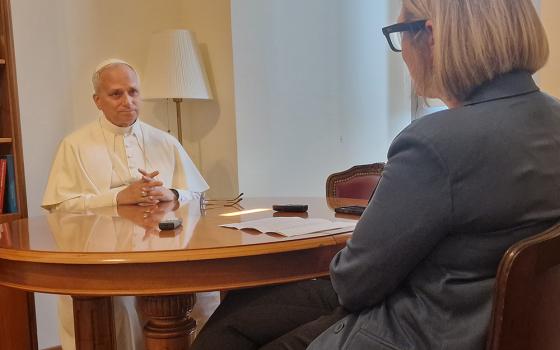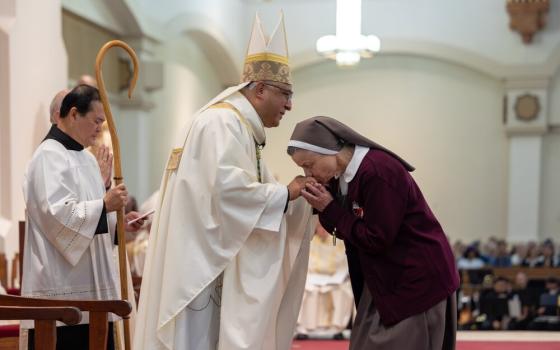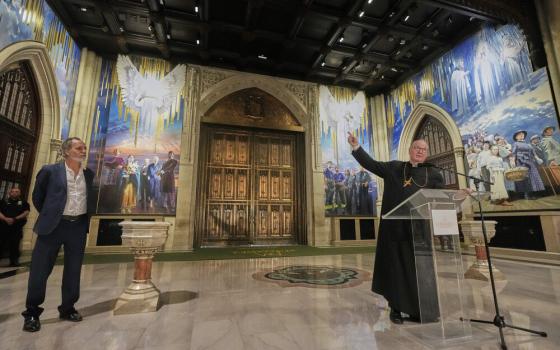A woman collects water for washing as floodwaters begin to recede in the aftermath of a 2019 cyclone near Beira, Mozambique. Many climate scientists have associated an increased number of natural disasters and their severity with climate change. (CNS/Reuters/Mike Hutchings)
In the waters off Mozambique's northern coast lies one of the largest gas reserves in Africa. Its discovery in 2010 gleamed of possible riches for one of the continent's poorest countries, but for thousands of people in the coastal province of Cabo Delgado, it meant the loss of their homelands.
At least 557 households were relocated to make way for infrastructure to support offshore gas drilling by several foreign energy companies, according to a 2023 report from Franciscans International.
Some of those who lost their homes turned for help to the Sisters of the Franciscan Missionaries of Mary, who have also ministered to others among the hundreds of thousands who fled their homes due to insurgent and terrorist attacks, which have been linked partly to the gas projects.
The fossil-fuel megaprojects under development also threaten air quality, fishing grounds and the local biosphere, the Franciscans’ report said, and stand to exacerbate climate change — three planned plants would increase national greenhouse gas emissions by 14%.
The gas exploration "profoundly altered the way of life of the local population," the report said. "This has had serious consequences for human rights."
Scenes like the one playing out in Mozambique, and around the globe, have led the Franciscans and other Catholic organizations to years of advocacy for the legal recognition of a human right to a healthy environment.
Those efforts received a victory in late July, when the International Court of Justice issued an advisory opinion declaring a healthy environment is not only a human right, but one foundational to many others.
"We were very, very, very excited and happy,” said Budi Tjahjono, international advocacy director for Franciscans International. “We've been awaiting that ruling for some time."
The unanimous July 23 opinion from the international court, dubbed "the World Court," made global headlines with this ruling, which also said international law requires nations to take action to limit climate change.
Catholic justice ministries and environmentalists have described the court opinion, while nonbinding, as a watershed moment for global efforts to address human-driven climate change and safeguard ecosystems and traditional lands.
Legal analysts say it could spur litigation against countries falling short in reducing heat-trapping greenhouse gas emissions that drive global warming. It may also increase pressure on nations later this year at the United Nations climate summit, COP30, in Brazil to commit to more ambitious measures — and actually deliver.
To date, 165 countries have enacted healthy environment laws. The U.S. is among 28 that have not, though several states, including Hawaii and Montana, have added it to state constitutions.
Smoke rises from brick factories' stacks in the town of Nahrawan in Baghdad, Iraq, June 5, 2022. (CNS/Reuters/Thaier al-Sudani)
"What Pope Francis and others have presented as a moral obligation [this opinion expands] to a legal obligation to prevent climate change, and consequences for those who fail to do that," said Lisa Sullivan, senior program officer on integral ecology for the Maryknoll Office for Global Concerns.
Legal obligation to cut emissions
The court's 15 judges called climate change an "urgent and existential threat" to nature and human populations, and said under international law all countries are obligated to control pollution. That includes even countries outside the 2015 Paris Agreement on climate change, such as the U.S. once its second withdrawal from the accord takes effect next year.
A country failing to protect the climate system from greenhouse gas emissions, including fossil fuel production, fossil fuel consumption, the judges wrote, "may constitute an internationally wrongful act which is attributable to that State."
A finding of a breach of international law would require a country to halt the polluting action and could lead to legal consequences, such as reparations, restitution and compensation to countries harmed by the pollution and related climate impacts, such as sea rise and extreme drought.
As for how it could apply to the U.S., judges could use it in their own decisions to interpret domestic law as well as international obligations, said Erika Lennon, a senior attorney at the Center for International Environmental Law. The advisory opinion could also become a basis for stronger environmental legislation or in lawsuits against the federal government or individual states, such as the numerous youth climate suits.
Lennon said the court's opinion was stronger than expected.
She said the court, considered the world's most authoritative interpreter of international law, has clarified "what the law requires in order to protect the environment and protect all the people on it, and current and future generations and ensure a livable future when it comes to the climate crisis," and what legal consequences they could face for noncompliance.
A Catholic Relief Services worker is pictured in a file photo helping a young woman at a food distribution area in Marojela village, located in the Marolinta commune in southern Madagascar's Beloha District. An ICJ advisory found the right to a healthy environment includes access to healthy food. (OSV/Courtesy Catholic Relief Services/Jim Stipe)
Legal recourse for countries failing to meet their climate commitments could help address the Paris Agreement's lack of enforcement, a criticism since its adoption 10 years ago.
Under the Paris accord, countries are required to submit new targets to reduce emissions every five years. The next pledges are due in September before COP30 in November in Belém, Brazil.
Environmental groups and faith-based organizations hope the court's opinion will encourage countries to be more ambitious. Pledges to date have fallen far short of limiting global temperature rise to 1.5 degrees Celsius (2.7 degrees Fahrenheit) above pre-industrial levels — the loftier goal under the Paris accord that the ICJ said is "the scientifically based consensus target."
Healthy environment a human right
The ICJ advisory opinion also clarifies that a healthy environment qualifies as a human right, said David Boyd, who served as U.N. special rapporteur on the right to a healthy environment from 2018 to 2024.
The right to a healthy environment includes access to clean air and water, healthy food, a safe climate and non-toxic surroundings where people live and work. It also includes things like access to environmental information, a voice in decision-making around land and natural resources and the ability to seek justice.
The new court ruling said a healthy environment is a precondition to "the right to life, the right to health and the right to an adequate standard of living, including access to water, food and housing."
Boyd called a legal recognition of the right "a fundamentally important tool for catalyzing accelerated action toward a just and sustainable future."
"Human rights were used historically to end slavery, to end apartheid, to end or to make progress in discrimination against women," Boyd said. "Those are the kinds of transformative social changes we need to make today in terms of our relationship with the Earth's life support system."
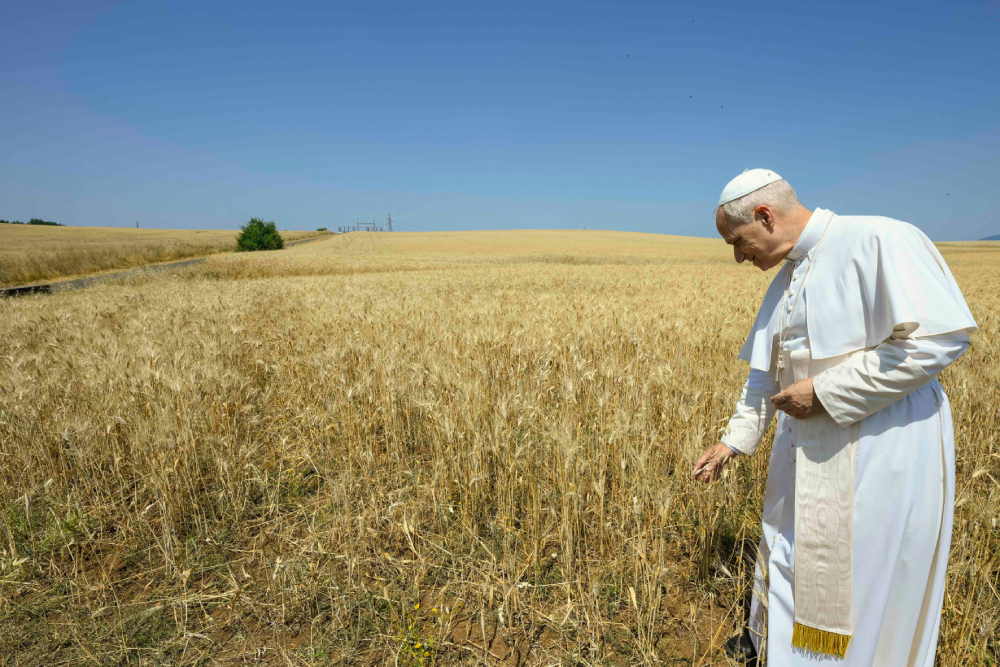
Pope Leo XIV visits a field where the Vatican is studying setting up a solar farm on land surrounding the Vatican Radio shortwave transmission center at Santa Maria di Galeria outside of Rome June 19, 2025. (CNS/Vatican Media)
Sullivan said that the court's ruling aligns with the Catholic understanding of care for creation. Pope Leo XIV earlier this summer described environmental justice explicitly as "a duty born of faith."
Beginning in 1972, organizations, faith-based groups and popes have championed a legal right to a healthy environment.
As U.N. special rapporteur, Boyd helped assemble an international coalition of nearly 1,400 organizations championing the right. "Some of the most active members were faith-based, and particularly, Catholic organizations," he said.
Franciscans International advocated for such recognition through work at the U.N. and its Human Rights Council. For Franciscans, Tjahjono said, tying a healthy environment to human rights goes back to St. Francis of Assisi, the patron saint of ecology.
"It's very clear that as Catholics, we are called to defend the planet, to defend the creation, to defend our common home. And this ICJ ruling, in fact, is really pushing that Catholic system of teachings to another level, toward the legal level," he said.
Advertisement
In 2008, the Vatican endorsed the right to a safe and clean environment among a set of 10 commandments for the environment, which were later published as a book under Pope Benedict XVI's name.
Pope Francis later supported the effort by the Council of Europe in 2021 to recognize this right in law. "We should also speak of the duties of every human being to live in a healthy, wholesome, and sustainable environment," both present and future generations, Francis said at the time.
In 2023, Cardinal Pietro Parolin signed on Francis' behalf a joint statement by 28 religious leaders that in part endorsed the concept.
The court's opinion will be a legal tool for Indigenous and local communities to seek reparations for climate-related losses and fight development on traditional lands and waters, activists say.
"Our global village is on fire, and it's those homes on the periphery that are feeling the effects," Sullivan said. "We have the moral voice calling for action, but this puts it in more concrete terms, in legal terms. And so it's just another really powerful tool to help put out this fire."

